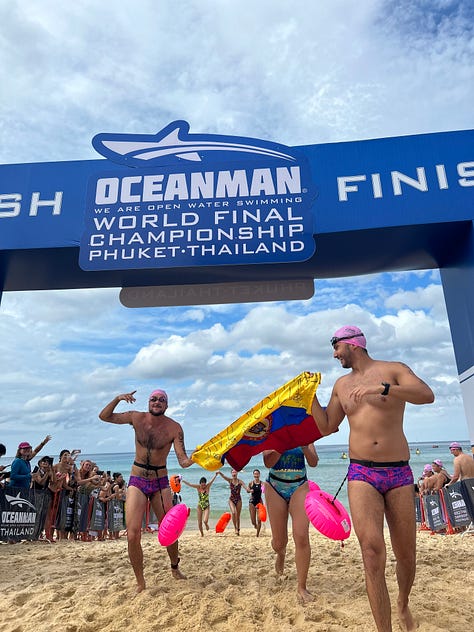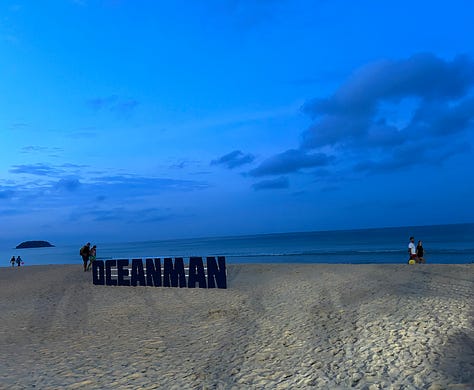How OCEANMAN changed my perspective on sports and community
Connection and camaraderie through open-water swimming
While in Thailand, Living Sport had the opportunity to travel to Phuket, one of the southernmost provinces and the country’s largest island, to help work the OCEANMAN World Final Championship. OCEANMAN is the only global international open-water swimming series, founded in 2015 by Fermin Egido Alonso.
One of the original things that attracted me to Living Sport, a sports business program and study abroad opportunity, was the chance to work an international sporting event. As someone who hasn’t traveled much, this was an incredible opportunity to explore the world through sport and see how large-scale events operate in other countries.
While the headquarters of OCEANMAN are in Spain, there are many franchises around the world which host events and races, including in Argentina, Colombia, Ukraine, Kazakhstan, Italy and Thailand.
The World Final included swimmers who qualified in their respective races in previous OCEANMAN events, and also an open series for any swimmer to register for. During the weekend, there was a 10k, a 5k, a 2k and a 500m swim for OCEANMAN kids.
Many of the sporting events and championships in the United States that I have experienced before are high budgeted, strictly time managed and rigidly structured from top to bottom. There is typically a hierarchy of people planning an event and those at the top are usually not accessible the day of. Often, large sporting events have massive million or even billion-dollar budgets that factor in advertising, entertainment and performances, food, merchandise, and more. This leads to skyrocketing costs for fans and makes it difficult for even the most passionate and dedicated fans to get tickets. These events are also often planned down to the second, which doesn’t allow any time to make any changes or adapt, or even simply make conversation and have the chance to meet with others working the event or those in attendance.
OCEANMAN helped to change my perspective on what makes a sporting event successful.
I had never worked, let alone been to a sporting event that was as smoothly run and as flexible as an OCEANMAN Final. If a race had to be delayed due to weather or other circumstances, the rest of the schedule would be adjusted accordingly. While there was definitely some stress and nerves from the swimmers or race managers, they didn’t show it, and consistently had smiles on their faces and a calm presence. If there were any major questions, the CEO, COO, coaches and the race director were readily available and easily accessible. They were always some of the first faces at the finish line, greeting and congratulating swimmers and presenting them their medals.
What I also hadn’t experienced before was a sport built so much on connection and community. I had never seen ocean-water swimming competitions before, so I came into the experience not knowing what to expect. What I was met with was such an incredible level of competition but also camaraderie among the swimmers. Even with 70 different countries in attendance, with different languages, customs and cultural differences, there was still an incredible level of respect among the 1,500 swimmers.
The pre-race activities, including a welcome dinner and a parade of nations, set the tone for the weekend. During the welcome dinner, strangers sat with one another, tried new foods and took photos together to kick off the festivities. During the parade of nations swimmers held their flags high and cheered loudly to represent where they had come from. During the first training session, after swimmers were grouped based on language preference and completed their first swim around the buoys, there was a relay race where swimmers teamed up with others they may not have known. They raced to run with a cup of water without spilling, passing the cup off to each swimmer in line. Just standing in line, conversations were started and stories were shared.
Some swimmers came to Thailand with their families, with their kids, with their spouses, with their parents. Some came in a small close-knit group representing their entire country. And others made the trek to Thailand alone. Regardless of the hours people traveled and how they got there, every swimmer came to Thailand to make themselves and their nations proud but to also meet new people.
Even at the finish line, seeing a swimmer from Mexio and a swimmer from Kazakhstan, or a swimmer from Ukraine and a swimmer from Colombia embrace and celebrate together was common. Even with a swimmer who just beat another for third place, there was no ill will and just pure joy at finishing the race. At the time cutoffs for the races, other swimmers and spectators came back to cheer on the final swimmer in the water on their way to the finish line.
What I have been exposed to in a lot of sports I’ve watched and competed in is that it is often win, medal or bust. I did not get that sense or feeling at all while working at OCEANMAN, as many of the people competing in the finals part of it were just supremely happy to have qualified and set on beating their own personal time. For those who simply swam in the open portion, they were just ecstatic to cross that finish line and have that medal hung over their neck as a sign that they pushed themselves and accomplished something huge.
I also met and watched some incredible people compete. I developed a close relationship to a man named Aditya from India, a swimmer with Type 2 Diabetes, who is passionate about telling his story, meeting new people and encouraging a healthy lifestyle. Another man I met from India, Arvind, started swimming at 51 years old and said swimming has become one of his favorite things in the world.
We had the opportunity to watch inspiring swimmers, such as a remarkable woman from Kazakhstan who is a double amputee. We cheered Jiachao from China who lost his left arm when he was five years old but said this inspired him to start swimming. We saw those representing their native country of Ukraine out loud and proud amidst a time of heartbreak and turmoil. There was a group from Poland who cheered each other on all weekend, waving their white and red flags. I admired an 81-year-old from Brazil who started swimming everyday once she retired and wants to inspire the younger generation. Carlos, from Colombia, brought high energy all weekend long in addition to his passion for sharks and protecting the ocean with the Sustainable Ocean Alliance.
Then there were the kids, who swam 500m and pushed themselves to run across the sand to the finish line, greeted by their families. And we cheered the 500m relay groups, who stood together and waited for their third and final swimmer to join hands and finish the last sprint together. Each athlete came into the weekend with a story to tell, and these stories shined from the initial starting horn to that moment of relief and pride crossing under that blue awning to receive a medal amidst a wave of supporters.
OCEANMAN taught me that sports can be both competitive and community- oriented. Athletes can want to win and congratulate others who came before them. Open-water swimming can be life saving for some and even just a hobby, giving them a purpose to get out and push themselves in the water every day. Thank you OCEANMAN for teaching me more about sports but also life.
“This is why OCEANMAN is so important. It connects humans with the ocean, and we protect what we love.” -Carlos Perez, Colombia









